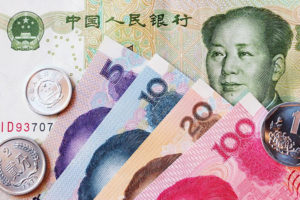Is the end of deflation in China near? Probably yes. What could this mean for markets?
China's consumer prices fell 0,8% year-on-year in January 2024, marking the fourth straight month of declines and the longest streak of declines since October 2009. The data fell short of market forecasts of a 0,5% decline, marking the biggest decline in over 14 years, with food prices falling at a record pace (-5,9% compared to -3,7% in December). Meanwhile, non-food inflation eased (0,4% vs. 0,5%) as the decline in transport prices accelerated (-2,4% vs. -2,2%), while clothing costs (1,6% vs. 1,4%), housing (0,3% vs. 0,3%), health (1,3% vs. 1,4%) and education (1,3% vs. 1,8%) continued to grow.
Core consumer prices, which exclude food and energy prices, rose 0,4% y/y in January, the weakest increase since June last year, after rising 0,6% in the previous three months. On a monthly basis CPI index rose 0,3%, marking the second month in a row of growth and reaching the highest level since August last year.
Base effect and the end of deepening deflation in China?
This is very likely, below, the price index in China saw its peak last year, as prices increased in January 2023 by as much as 0,8% m/m. Thus, a base effect was created, which will probably first reduce deflation, and then lead to inflation, which we will probably be able to observe already between March and June. This is when the base effect will have the greatest impact on calculating inflation year to year.
CHECK: How to invest in Asian Indices? [Guide]
Market reaction to inflation data and expectation of further support from the Chinese authorities
China's 10-year government bond yield fell below 2,45%, hovering near its lowest levels in more than two decades. This, in turn, supported expectations for further easing of monetary policy. Investors also continued to evaluate China's latest policy moves to stabilize financial markets, and Beijing named a new head of the country's securities regulator. Chinese authorities have also taken steps to clamp down on short selling and ordered sovereign funds to step up ETF purchases. On the monetary policy front, the People's Bank of China lowered bank reserve requirements by 50 basis points starting in February, a move expected to release about 1 trillion yuan of long-term capital for the economy.
The above picture, together with the cessation of y/y deflation already in the next two months, has a chance to give a breather to the relatively cheap Chinese market, which may result in, firstly, a reduction of short positions, and secondly, an inflow of capital to a relatively attractive market with simultaneous blocking of the outflow. capital from China.






















![Forex Club – Tax 9 – Settle tax on a foreign broker [Download the Application] Forex Club - Tax 9](https://forexclub.pl/wp-content/uploads/2024/02/Forex-Club-Podatek-9-184x120.jpg?v=1709046278)
![Trading View platform – solutions tailored to the needs of traders [Review] trading view review](https://forexclub.pl/wp-content/uploads/2024/03/trading-view-recenzja-184x120.jpg?v=1709558918)
![How to connect your FP Markets account to the Trading View platform [Guide] fp markets trading view](https://forexclub.pl/wp-content/uploads/2024/02/fp-markets-trading-view-184x120.jpg?v=1708677291)
![CRB index – one of the popular commodity market benchmarks [Guide] crb index](https://forexclub.pl/wp-content/uploads/2024/05/indeks-crb-184x120.jpg?v=1715055656)
![How to invest in ChatGPT and AI? Stocks and ETFs [Guide] how to invest in chatgpt and artificial intelligence](https://forexclub.pl/wp-content/uploads/2023/02/jak-inwestowac-w-chatgpt-i-sztuczna-inteligencje-184x120.jpg?v=1676364263)





![Izabela Górecka – “Success on the market depends not only on knowledge, but also on emotional stability” [Interview] Izabela Górecka - interview](https://forexclub.pl/wp-content/uploads/2024/04/Izabela-Gorecka-wywiad-184x120.jpg?v=1713870578)
![WeWork – the anatomy of the collapse of a company valued at $47 billion [WeWork, part II] wework bankruptcy story](https://forexclub.pl/wp-content/uploads/2024/04/wework-bankructwo-historia-184x120.jpg?v=1711729561)
![Adam Neumann – the man who screwed up Softbank [WeWork, part AND] adam neumann wework](https://forexclub.pl/wp-content/uploads/2024/04/adam-neumann-wework-184x120.jpg?v=1711728724)


![The most common mistakes of a beginner trader - Mr Yogi [VIDEO] Scalping - The most common mistakes of a beginner trader - VIDEO](https://forexclub.pl/wp-content/uploads/2024/03/Scalping-Najczestsze-bledy-poczatkujacego-tradera-VIDEO-184x120.jpg?v=1711601376)
![Learning patience: No position is also a position - Mr Yogi [VIDEO] Scalping - Learning patience - No position is also a position - VIDEO](https://forexclub.pl/wp-content/uploads/2024/03/Scalping-Nauka-cierpliwosci-Brak-pozycji-to-tez-pozycja-VIDEO-184x120.jpg?v=1710999249)
![When to exit a position and how to minimize losses - Mr Yogi [VIDEO] Scalping - When to exit a position and how to minimize losses - VIDEO](https://forexclub.pl/wp-content/uploads/2024/03/Scalping-Kiedy-wyjsc-z-pozycji-i-jak-minimalizowac-straty-VIDEO-184x120.jpg?v=1710336731)


















